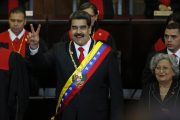
Argentina’s key oil-producing provinces have threatened to cut supplies to the rest of the country if President Javier Milei moves forward with a plan to cut funding and withhold billions in federal tax revenues, the Buenos Aires Herald recently reported.
Milei’s government has “illegally retained” 13.5 billion pesos ($15.3 million) in monthly federal tax revenue transfers from the major crude-producing province of Chubut in Patagonia, its governor, Ignacio Torre, claimed. Based on Argentine Economy Minister Luis Caputo, the measure is viewed as a means of collecting on unpaid debt from Chubut and nine other oil-producing provinces. Patagonia, in the south of Argentina, is home to most of the country’s oil output.
Milei’s fiscal policies have sparked a fierce backlash from the regions that are crucial to Argentina’s energy sector.
“Not a drop of oil will come out on Wednesday if they don’t respect the provinces once and for all and take their foot off our back,” Torres told the broadcaster C5N on Saturday.
As part of Milei’s austerity plan, the new government announced it would cut subsidies to companies providing transportation services nationwide — a move that could drive up the price of public transport across the country. The authorities also slashed in January so-called discretionary funding to a number of provinces by 98 percent. The funds are distributed to the country’s states besides the tax revenue they receive from the national government.
The governors of the oil-producing provinces backed Torres in threatening to halt supplies until the government released the funds. Torres argued that the move will affect more than 600,000 people in Chubut, as it “impacts on their right to education, health, security and development.”
In response, Milei took to X to label Torres and his peers as “fiscal degenerates” and has threatened jail sentences of up to two years for anyone impeding energy supplies.
The standoff has sparked concerns among economists about Argentina’s ability to keep its oil production and supply chains steady, disruptions to which could impact both national and international markets.
Based on market analyst Artemio Lopez, Milei might have “miscalculated” the possible fallout of his policies.
“This is an unprecedented conflict due to its reach,” he said. “There is a rebellion in the provinces, and a mistaken assessment by Milei about the level of conflict.”
For the president, arguing with a deeply unpopular parliament is “one thing,” Lopez said. “But it is not the same when confronting governors. Most of them got a higher percentage of the vote than he did in the last election.”
Argentina ranks as the world’s 39th largest crude exporter and 20th largest supplier of natural gas, according to official data.
The dispute comes amid rising protests over price hikes triggered by Milei’s “shock therapy reforms” in Argentina while its economy suffers a three-decade-high inflation rate of more than 250 percent, based on official data on February 14.
According to Milei, Argentina’s “economic activity would have fallen much more” had he not enforced the new policies. “We are focusing on taking care of the most vulnerable class,” the president contended. A self-described anarcho-capitalist, Milei, who took office in December 2023, has warned it will take time for the results of his program to be seen and that things could get worse before they get better. Latin America’s third-largest economy has been plagued by a severe economic crisis after decades of financial mismanagement.
In January, the International Monetary Fund (IMF) revised down its economic outlook for Argentina, forecasting a second straight year of negative growth amid Milei’s push for what the IMF report calls a “significant policy adjustment” in his country.
In its January World Economic Outlook update, the IMF said that Argentina’s gross domestic product will contract 2.8 percent this year, following a 1.1 percent decline in 2023. Back in October, the IMF had projected 2.8 percent growth for the economy in 2024. As per the report, Argentina’s inflationary surge was the main driver pushing up the 2024 inflation outlook for emerging markets and developing economies, sending it to 8.1 percent.
“The [Latin America and Caribbean] forecast revision for 2024 reflects negative growth in Argentina in the context of a significant policy adjustment to restore macroeconomic stability,” the IMF stated.
Poverty levels in Argentina reached a multi-year high in January after drastic economic reforms staged by Milei, the Social Debt Observatory of the Catholic University of Argentina (UCA) said in its report.
According to the data, the share of people in poverty in the country surged to 57.4 percent last month, the highest since 2004, and up from 44.7 percent in the third quarter of 2023, prior to Milei taking office.
Besides, the report stated that the greatest increase in poverty levels was noticed among middle-class households that were not beneficiaries of social programs, as well as among low-skilled workers. Per the data, the percentage of Argentinians considered “destitute” surged to 15 percent in January, up from 9.6 percent in the third quarter of last year.
The head of the UCA’s Social Debt Observatory, Agustin Salvia, told La Nacion news outlet that he does not expect poverty levels to grow much further, but warned that the situation will likely get worse before it gets better.
“In February and March the situation will tend to worsen, but poverty will find a ceiling of around 60%. There is an expectation that it will tend to improve in two or three months,” he predicted.
Milei reacted to the UCA report in a social media post, pledging that more reforms would mitigate the crisis in the country.
“The true inheritance of the caste model: 6 out of every 10 Argentines are poor. The destruction of the last hundred years is unparalleled in Western history. Politicians have to understand that people voted for change and that we are going to give our lives to bring it about,” he wrote.




